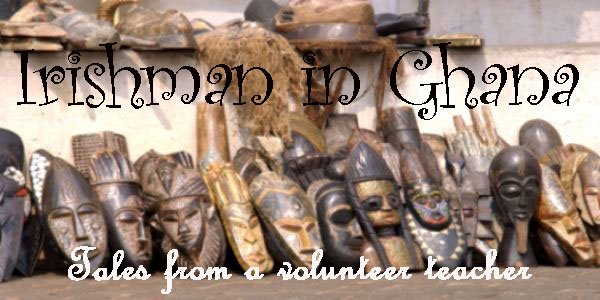
Wheelchair beneficiaries at ceremony in Edwenase last week. The Mormons soponsored 750 wheelchairs for Ghana
I am 3 weeks in Ghana today. as is often the case when one embarks on a journey, characters who cross your path in the initial stages of assimilation have a tendency to pop in and out to varying degrees of friendliness.
This coming Thursday, I am hoping that Gloria Quist, a Ghanaian native and nurse educator who has lived in the US since 1991, will give some First Aid training to staff and students at Edwenase. Gloria was in seat 28A on our British Airways flight from London Heathrow. We got talking about racism in the US, Ghanaian culture and politics mid way through the flight.
Her short trip back home had been filled with drama. 10 days after arrival, travelling with her nurse friends over from the US for the first time (among their questions were: „Does Ghana have cars and tomatoes?”). Anyhow, too cut a long story short, travelling near Kumasi last week a drunk stepped out in front of their car, they knocked him down and he died soon after in hospital. Although he was at fault, the shock remained with Gloria and that as the reason why she hadn't managed to visit our project with her friends.
Thankfully though she is due to come soon and her skills and authority will be a great asset in convincing students and staff alike that one teen girl who has epilepsy is not actually possessed by demons. In addition to this we are hoping education about early intervention in keeping wounds clean and dressed properly will reduce the amount of infections we see here daily. Lastly, we hope this will be a trust building exercise amongst us, the volunteers, and the staff.
At this stage, it seems to me that we are courteous up front but both sides are highly critical of the role being played by the other. From my perspective, it doesn't inspire confidence to see the hairdressing teacher sit in a chair for 2 hours in her classroom with an air of disinterest, while her 3 students teach other. Or that the head of the visually handicapped, literacy and numeracy department only had his first lessons last week for this semester (which officially began in late August). His 56 students have therefore received no tuition on these issues for 4 months as prior to the start for the school year they were back with their families.
On the other hand, with little interaction between us or a clear vision as to what role the volunteers play here, it's difficult for them I think to see us as anything other than naive well do-wishers who really are out of touch. I reckon we have a fair idea as to why there is little motivation or opportunity for them to drive their department to vocationally train students.
Broken machines, lack of material, little positive affirmation of their work in difficult circumstances, solidified by years of neglect by the Social Welfare department and harsh judgements by the rest of society upon those with special needs and their potential role in the future of their communities, combine to create a recipe for educational disaster. Though despite all of this, most of the teachers do what they can to pass on their excellent skills in needlework, shoemaking, tailoring, and dressmaking.
The catering, hairdressing an rural craft sectors have need for much investment and assessment to determine how they can address the difficulties of their students and the obvious lack of material to use in order to train them in their trade.
With time I am confident that we can forge a path together. Tomorrow we will kick start literacy and numeracy classes. The Christmas card project is off to a flying start and we are already running out of cards, and banana leaves! The dry season is kicking in, sweat is rolling down my forehead like a waterfall and evening showers are a joy to behold.
 Our Ghana flag project with the rural craft department. Green leaves used for the Ashanti region's garden city, Kumasi
Our Ghana flag project with the rural craft department. Green leaves used for the Ashanti region's garden city, Kumasi The final product. Red for blood flowed, gold for their rich mineral resource, black star for Pan-Africanism
The final product. Red for blood flowed, gold for their rich mineral resource, black star for Pan-Africanism

No comments:
Post a Comment